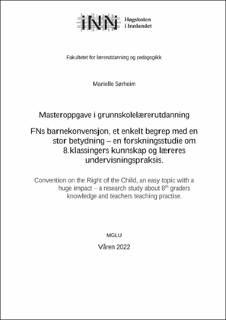| dc.contributor.advisor | | |
| dc.contributor.author | Sørheim, Marielle. | |
| dc.date.accessioned | 2022-09-20T16:18:00Z | |
| dc.date.available | 2022-09-20T16:18:00Z | |
| dc.date.issued | 2022 | |
| dc.identifier | no.inn:inspera:111594821:32235506 | |
| dc.identifier.uri | https://hdl.handle.net/11250/3019766 | |
| dc.description.abstract | I denne masteroppgaven har jeg tatt for meg FNs barnekonvensjon som tematikk. Oppgaven er en kombinert kvalitativ og kvantitativ studie av elever og læreres forhold til tematikken. Problemstillingen min lyder som følger: hva vet 8.klassinger om FNs barnekonvensjon og hvordan arbeider lærere med FNs barnekonvensjon i undervisning? Formålet med studien er å belyse hva 8.klassinger kan om FNs barnekonvensjon, og hvordan en knippe lærere underviser om tematikken på skolen. Den metodiske tilnærmingen for studien er en kvantitativ spørreundersøkelse av 8.klassinger ved en skole på Østlandet og kvalitative semistrukturerte intervjuer av fire lærere fra Østlandet og Vestlandet. Jeg anså en kombinasjon av kvantitativ og kvalitativ metode som best egnet fordi det ga meg et innblikk i hva dagens elever kan om FNs barnekonvensjon. Jeg benyttet resultatene fra spørreundersøkelsen til å formulere intervjuguiden til de semistrukturerte intervjuene, og på den måten ble tematikken mer aktuell. Drøftingen av empirien har forgått i to deler. Del en omhandler elevenes kunnskaper sett i lys av hva som kommer frem av FNs barnekonvensjon. I del to har jeg tatt for meg undervisningsperspektivet, og tolket dette blant annet ut ifra den sosiokulturelle læringsteorien og Lev Vygotskys teori om utvikling av språket og den proksimale utviklingssonen. Avslutningsvis diskuterer jeg ulike momenter fra drøftingen opp mot tidligere forskning om elevers kunnskap om FNs barnekonvensjon. Undersøkelsen viser at dagens elever har et grunnleggende kunnskapsnivå når det kommer til FNs barnekonvensjon. De har vanskeligheter med å uttrykke hva konvensjonen omhandler utenom det de selv har erfaringer fra. Lærerne opplever FNs barnekonvensjon som et tema som fort blir nedprioritert på grunn av tid og personlige preferanser. De opplever at elevene har manglende begrepskunnskap når det kommer til FNs barnekonvensjon, og at enkelte 8.klassinger kanskje ikke er modne nok til å begi seg ut på tematikken. Oppgavens funn blir naturligvis formet av hvordan jeg som forsker har formulert spørsmålene og hvem jeg har intervjuet. Det kan vise seg at enkelte deler av empirien ville ledet i en annen retning dersom jeg hadde hatt mindre åpne spørsmål og mer forklaringer i spørreundersøkelsen. | |
| dc.description.abstract | In this master thesis I have explored the convention on the Right of the Child. The thesis is a combination of a quantitative and a qualitative study on 8th graders and social studies teachers’ relations to the convention on the right of the child. The research question is: what does 8th graders know about the convention on the right of the child, and how does teachers work with the convention on the right of the child in their lessons? The main purpose with the study is to illustrate what 8th graders knows about the convention, and how teachers that teach social studies teach about it. The methodological approach of the thesis is a quantitative survey of a group 8th graders from a school at Østlandet. The qualitative approach of thesis is four semi structural interviews of teachers from Østlandet and Vestlandet. I saw a combination as the best methodological approach because it gave me the possibility to use new information about the knowledge to the students of today about the convention of the right of the child. I used the results from the quantitative survey as a base to create the questionary for the semi structural interviews. I think the theme will be more relevant when I do a combination. The discussion of the empirical has taken place in two parts. The first part deal with 8th graders knowledge in the light of what emerges from the Convention on the Right of the Child. In the second part, I have considered the teaching perspective. I have interpreted it based on the sociocultural learning theory and Lev Vygotsky’s theory on language development and the zone of proximal development. In the conclusion, I discuss various aspects from the discussion up to previous research on students’ knowledge of the Convention on the Rights of the Child. The survey shows that the students of today have a basic level of knowledge when it comes to the Convention on the Rights of the Child. They have difficulty expressing what the convention deals with beyond what they have experienced themselves. Teachers experience the Convention on the Rights of the Child as a topic that is quickly downgraded due to time and personal preferences. They experience that the students have a lack of conceptual knowledge when it comes to the Convention on the Rights of the Child, and that some 8th graders may not be mature enough to explore the subject. The findings of the thesis are naturally shaped by how I as a researcher have formulated the questions and who I have interviewed. One may believe that some parts of the empiric would have led in a different direction if I had had fewer open questions and more explanations in the survey. | |
| dc.language | nob | |
| dc.publisher | Inland Norway University | |
| dc.title | FNs barnekonvensjon, et enkelt begrep med en stor betydning – en forskningsstudie om 8.klassingers kunnskap og læreres undervisningspraksis. | |
| dc.type | Master thesis | |
